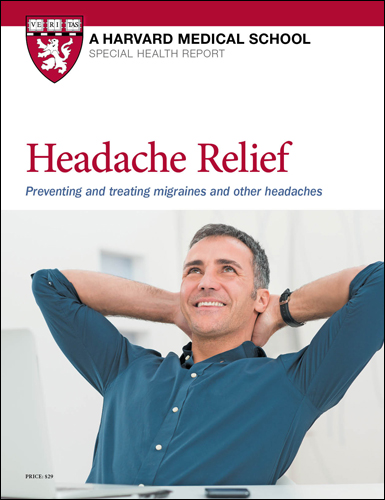Dealing with dizziness
This symptom is rarely triggered by a serious condition, but does sometimes warrant emergency attention.
 You stepped out of bed this morning and suddenly felt a little woozy and unsteady on your feet. The feeling went away quickly, but now you're worried. Was it caused by a serious health problem?
You stepped out of bed this morning and suddenly felt a little woozy and unsteady on your feet. The feeling went away quickly, but now you're worried. Was it caused by a serious health problem?
Many people experience such episodes, broadly referred to as dizziness. The term can embrace a range of sensations. You might feel floaty, unsteady, or lightheaded. Or you might feel what doctors call vertigo: the sense of spinning or being in motion even though you're standing still.
Luckily, most of the time these symptoms stem from a minor or easily treatable cause, says Dr. Shamai Grossman, a cardiologist and emergency medicine physician at Harvard-affiliated Beth Israel Deaconess Medical Center. Only rarely are they prompted by something more serious, he says.
That said, even if the source of your symptoms isn't dangerous, dizziness can still be problematic because it can cause you to fall and break a bone or hit your head, says Dr. Grossman. So, you should be aware of things that might trigger these episodes and signs that your condition warrants immediate medical attention.
Understanding common triggers
When people experience dizziness, there are typically a few common culprits, says Dr. Grossman.
Dehydration. When you don't drink enough water, your blood volume can drop, along with your blood pressure. This reduces blood flow to your brain, which can make you feel lightheaded. Certain medications, in particular diuretics (water pills), may make you prone to dehydration.
Ear issues. An infection or another problem that affects your inner ear can lead to dizziness and vertigo. One common cause is fluid buildup inside your ear from an infection.
Another problem, called benign paroxysmal positional vertigo, happens when tiny calcium crystals (otoconia) break free from a sac inside the ear and travel into nearby passageways, floating in the fluid there. When your head moves, the displaced crystals also move, interfering with nerve signals to the brain and causing that spinning sensation.
Alcohol use. Drinking alcohol not only leads to dehydration, but also affects the consistency of the fluid in the inner ear. These changes may disrupt your balance, cause vertigo, or other symptoms.
Anemia. A deficiency of iron, vitamin B12, or folic acid sometimes causes this condition. It's characterized by a deficit in the number of red blood cells, which transport oxygen throughout the body. When there aren't enough red blood cells circulating, you may feel tired and lightheaded.
Hormone shifts. Some women, particularly those who have hot flashes, experience lightheadedness due to temporary fluctuations in hormone levels during the menopausal transition.
Orthostatic hypotension. Thanks to gravity, when you stand up quickly your blood flow shifts toward your feet. Your body compensates by alerting your blood vessels to contract and your heart to pump harder to re-establish the blood supply to your upper body and head. But in an estimated 20% of people over age 65, this response is slower, creating some lag between the time you stand up and when the blood reaching your brain returns to normal levels. This can make you feel lightheaded. Certain medications, including beta blockers (often prescribed to treat high blood pressure), may make the problem worse. The same is true for some underlying health conditions, such as diabetes.
Potential warning signs
In rare instances, dizziness signals an emergency heart or brain condition. One of these is an abnormal heart rhythm (arrhythmia) caused by an interruption of the electrical currents that are needed for your heart to pump blood to the rest of your body, including your brain. When the heart's rhythm isn't normal, you may feel faint.
Dizziness may also be caused by a problem in your cerebellum, a neuron-rich region in the back of your brain that controls balance, movement, and coordination. Brain problems, such as a stroke or a tumor in this area, may produce these symptoms.
However, these more serious conditions typically cause multiple, longer-lasting, and more frequent symptoms. For example, a cerebellar stroke from a blood clot that impedes the blood supply to your brain might in-duce vertigo. But this vertigo wouldn't go away quickly or be intermittent, says Dr. Grossman. In addition to lasting for a longer period of time, it would typically be accompanied by other warning signs, such as an uneven gait, or problems with memory or speech. A tumor in your cerebellum might produce similar effects.
If a heart abnormality is causing your symptoms, you might not only be dizzy but also experience a change in blood pressure or a very rapid heart rate.
"What's tricky is sorting out who has a more severe underlying problem," says Dr. Grossman.
So, always be sure to err on the side of caution, particularly if you have a history of (or risk factors for) heart or blood vessel problems.
Also seek immediate help if you experience any of the following:
- Your symptoms last for more than 15 minutes.
- Your symptoms feel worrisome.
- You are experiencing neurological changes such as difficulty walking, weakness, or numbness in one part of your body.
Reducing the risk of a fall
Other types of dizziness aren't necessarily a medical emergency, but they should be brought to the attention of your doctor to help determine the reason behind your symptoms, particularly if they are happening regularly.
"If you are having dizziness weekly or more often, then you should seek medical attention," says Dr. Grossman.
Your doctor might also want to prescribe medication to help your condition, and give you strategies to pre-vent a fall. Some that might help are
- drinking more water
- trying alternatives to medications that could be causing your symptoms
- avoiding alcohol
- standing up more slowly
- wearing compression stockings to help maintain blood flow.
"For some adults, having a family member or home health aide assist them in getting out of bed in the morning can help ensure that they are safe and don't experience a fall," says Dr. Grossman.
Switching to a bed that is lower to the ground might prevent an injury if you do fall.
Image: © Mykyta Dolmatov/Getty Images
About the Author

Kelly Bilodeau, Former Executive Editor, Harvard Women's Health Watch
Disclaimer:
As a service to our readers, Harvard Health Publishing provides access to our library of archived content. Please note the date of last review or update on all articles.
No content on this site, regardless of date, should ever be used as a substitute for direct medical advice from your doctor or other qualified clinician.
















